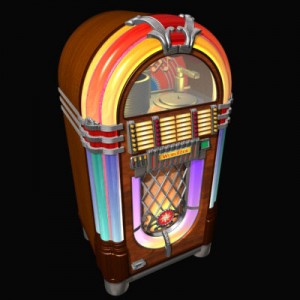As the song goes, everyday we're shuffling.
In fact, people have long been enjoying the practice of admixing tunes and picking out the ones that please their tastes. Back in the 18th century, concert patrons in England were already treated to an assortment of musical compositions with varying intensity and rhythm. Over the years, the shuffle went from manual to digital, thanks to jukeboxes, radio jocks, the iPod, and most recently, the music streaming apps.
 |
| Image Source: milliesdiner.com |
Such services have become so phenomenal that half of the American population own at least one such shuffling app in their mobile devices. Such success can be attributed to the unique experience it offers.
Its major strength lies on the idea of the stream---that ceaseless flow of data that people can access thanks to the complex science of Big Data. On top of the almost endless catalog of songs (20 to 30 million based on available data), subscribers get well-curated recommendations based on their social media profiles, habits, and attitudes, making the listening experience far more personalized and more rewarding than any listening device ever produced.
 |
| Image Source: blog.blockless.com |
Another advantage is choice---an almost infinite wealth of it. Evan Eisenberg, in his 1987 book titled "The Recording Angel," describes how music, like any other commodity, is consumed in an age where cultural priorities and preferences are rapidly shifting from the communal to the individual. Self-expression is hinged on the freedom to choose from whatever brands (of music, in this regard) are available and to form a unique combination out of one's choices. Subscribing to a streaming service sustains the people's hunger for individuality: it's like going to a supermarket with tens of millions of songs to browse and listen to.
Thus, thanks to apps like Spotify, Pandora, and Station Digital, listeners can get to play, pause and skip songs without interference from disk jockeys and with minimal or no commercial interruption. And because sound quality is consistent regardless of weather and location, listeners never have to worry again about being interrupted by poor radio signal.
 |
| Image Source: fostu.com |
Last but not least, streaming apps break geographical and cultural boundaries like no station or device ever did. They are available for smartphone and tablet users worldwide, while playlists carry an array of songs that cut across genres and boundaries. Thus, users of music streaming services from countries like India do not only get their fix of US Billboard-charting singles and local smash hits, they are also free to explore the best of music from foreign cultures for a more diverse bridging of worlds and tastes.
Aiming to give music lovers the best listening experience, Timothy Munro Roberts developed Station Digital to give unlimited access to the latest and greatest tracks. Visit this blog for more information on the music streaming industry.





